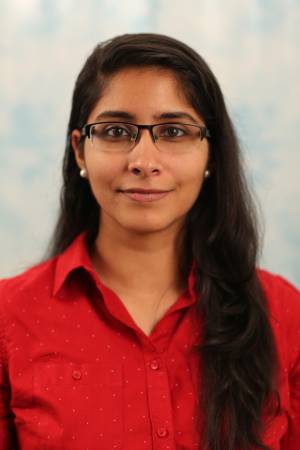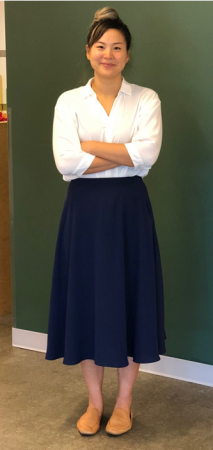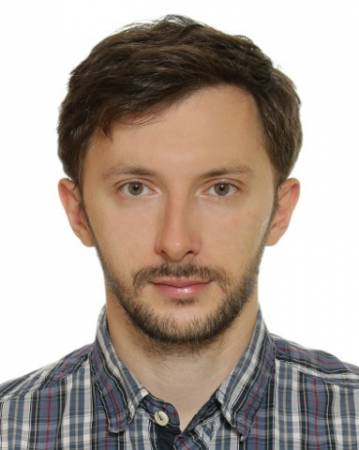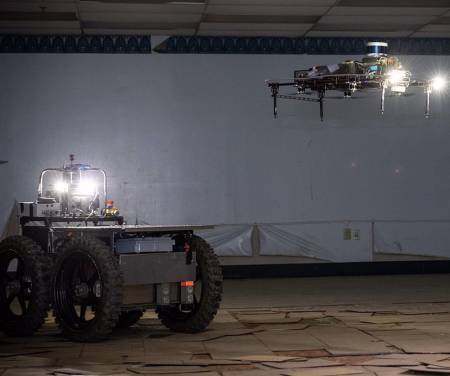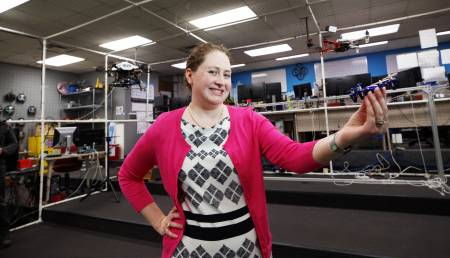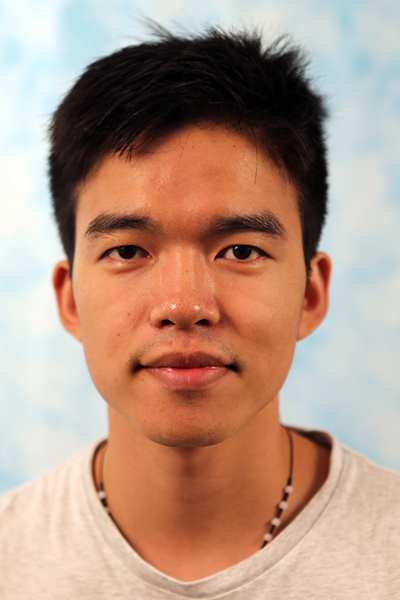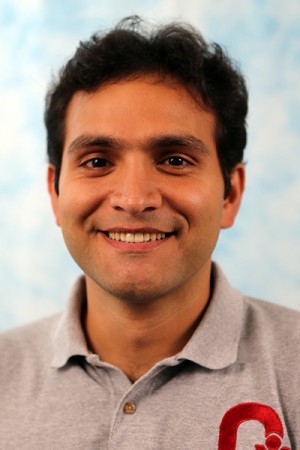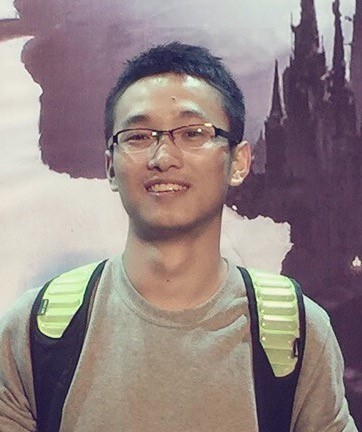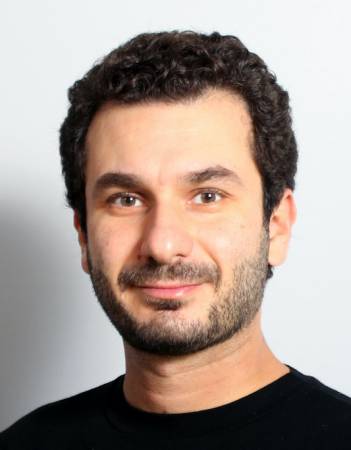Carnegie Mellon University
Ryan Coulson – MSR Thesis Talk
Zoom link: https://cmu.zoom.us/j/91138367616 Title: Soft Materials Architectures for Robot Manipulation Abstract: Robot manipulation has been a prolific subject of academic research for several decades - however, today's robotic manipulators have yet to demonstrate an ability to perform robust and versatile dexterous manipulation. This challenge can largely be attributed to a tradeoff between complexity and capability [...]
Carnegie Mellon University
Anish Bhattacharya – MSR Thesis Talk
Zoom link: https://cmu.zoom.us/j/4413360562 Title: Toward Increased Airspace Safety: Quadrotor Guidance for Targeting Aerial Objects Abstract: As the market for commercially available unmanned aerial vehicles (UAVs) booms, there is an increasing number of small, teleoperated or autonomous aircraft found in protected or sensitive airspace. Existing solutions for removal of these aircraft are either military-grade and too [...]
Carnegie Mellon University
Aaron Miller – MSR Thesis Talk
Zoom link: https://cmu.zoom.us/j/95386019509?pwd=cmNnTm9lWWlNbTh1SmQ0RU5PVTBmQT09 Title: Cooperative Perception for Pairs of Self-Driving Cars Abstract: Fully autonomous vehicles are expected to share the road with less advanced vehicles for a significant period of time. Furthermore, an increasing number of vehicles on the road are equipped with a variety of low-fidelity sensors which provide some perception and localization [...]
Carnegie Mellon University
Sara Misra – MSR Thesis Talk
Zoom link: https://cmu.zoom.us/j/3216213856 Title: Learning-based modular framework for environment-adaptive planning in exploration tasks Abstract: Search-based path planning has spawned a number of different solutions using different paradigms and strategies, both generalized and specific to certain problems, representations, and environments. Split into heuristic and non-heuristic based approaches, where heuristic-based approaches, embedded within these approaches [...]
Carnegie Mellon University
Blake Buchanan – MSR Thesis Talk
Location: https://cmu.zoom.us/j/99874277969?pwd=Q1MvczNhWTB4UmF3UXFOMEFtVG1uZz09 Title: Mechanics and Control of Coupled Interactions in Ambient Media Abstract: Many multi-agent systems in nature comprise agents that interact with, and respond to, the dynamics of their environment. For example, fish school based on the fundamental fluid phenomena of vortex shedding, birds shed leading-edge vortices in formation for flocking, and E. coli bacteria [...]
Carnegie Mellon University
Online Inference of Joint Occupancy using Forward Sensor Models and Trajectory Posteriors for Deliberate Robot Navigation
Zoom Link Abstract: Robotic navigation algorithms for real-world robots require dense and accurate probabilistic volumetric representations of the environment in order to traverse efficiently. Sensor data in a Simultaneous Localisation And Mapping (SLAM) context, however, always has associated acquisition noise and pose uncertainty, and encoding this within the map representation while still maintaining computational tractability [...]
Computational Imaging: Beyond the Limits Imposed by Lenses
Virtual VASC Seminar: https://cmu.zoom.us/j/92587238250?pwd=S0paYUVBUXozQkFTclMwRUg0MzBNZz09 Abstract: The lens has long been a central element of cameras, since its early use in the mid-nineteenth century by Niepce, Talbot, and Daguerre. The role of the lens, from the Daguerrotype to modern digital cameras, is to refract light to achieve a one-to-one mapping between a point in the scene and a point on the sensor. This effect enables the sensor to compute a particular two-dimensional (2D) [...]
Beyond ROS: Using a Data Connectivity Framework to build and run Autonomous Systems
Virtual FRC Seminar: Seminar recording: https://cmu.zoom.us/rec/share/x84qF7_q8TlIcpHoyG_DRa58O6i8aaa8hCAW_fEPxEkBGjBVPyzW_lK0YW30RfJ3?startTime=1598551489000 Passcode: qu6)ePH9 Abstract: Next-generation robotics will need more than the current ROS code in order to comply with the interoperability, security and scalability requirements for commercial deployments. This session will provide a technical overview of ROS, ROS2 and the Data Distribution Service™ (DDS) protocol for data connectivity in safety-critical cyber-physical [...]
Learning 3D Reconstruction in Function Space
Virtual VASC Seminar: https://cmu.zoom.us/j/96635002737?pwd=RkxGVlJaUTlhcDdGeVBPcnpTS015dz09 Abstract: In this talk, I will show several recent results of my group on learning neural implicit 3D representations, departing from the traditional paradigm of representing 3D shapes explicitly using voxels, point clouds or meshes. Implicit representations have a small memory footprint and allow for modeling arbitrary 3D toplogies at [...]
Carnegie Mellon University
Machine Learning Parallelism Could Be Adaptive, Composable and Automated
Zoom Link Abstract: In recent years, researchers in SysML have created algorithms and systems that parallelize ML training over multiple devices or computational nodes. As ML models become more structurally complex, many systems have struggled to provide all-round performance on a variety of models. Particularly, ML scale-up is usually underestimated in terms of the amount [...]
Carnegie Mellon University
Computational Contact Modes for Robotics
Zoom Link Abstract: A central theme in robotics is that of robots interacting with the world through physical contact. Whether it is a walking robot or robotic manipulator picking up an object, such as a spoon, we desire robots that physically interact with their environments. One significant challenge in physical robot interactions involves dealing with [...]
Carnegie Mellon University
Data-Driven Robotic Grasping in the Wild
Zoom Link Abstract: Humans can effortlessly grasp a wide variety of objects in diverse environments. On the other hand, robotic grasping has been extremely challenging in practice and is far from matching human dexterity. Despite recent progress in the community, most research is still largely focused on constrained environments like picking individual objects on a [...]
Scaling Probabilistically Safe Learning to Robotics
Abstract: Before learning robots can be deployed in the real world, it is critical that probabilistic guarantees can be made about the safety and performance of such systems. In recent years, safe reinforcement learning algorithms have enjoyed success in application areas with high-quality models and plentiful data, but robotics remains a challenging domain for [...]
Carnegie Mellon University
Routing for Persistent Exploration in Dynamic Environments with Teams of Energy-Constrained Robots
Abstract: Disaster relief scenarios require rapid and persistent situational awareness to inform first-responders of safe and viable routes through a constantly shifting environment. Knowing what roads have become flooded or are suddenly obstructed by debris can significantly improve response time and ease the distribution of resources. In a sufficiently large environment, deploying and maintaining fixed [...]
Compositional Representations for Visual Recognition
Virtual VASC - https://cmu.zoom.us/j/99437689110?pwd=cWxuQkIwWlFFZEk0QkVDUVFiN0lTdz09 Abstract: Compositionality is the ability for a model to recognize a concept based on its parts or constituents. This ability is essential to use language effectively as there exists a very large combination of plausible objects, attributes, and actions in the world. We posit that visual recognition models should be [...]
Sparse Spatial Hashing for Dense 3D Reconstruction
Abstract: Real-world 3D data is locally dense but globally sparse. Therefore, efficient sparse data structures are an essential component of dense 3D perception for computer vision and robotics. We manifest the power of spatial hashing by two typical tasks: dense scene reconstruction and global registration. In the first task, we accelerate volumetric integration and surface [...]
Carnegie Mellon University
Coordinated online multi-robot planning
Abstract: Multi-robot applications frequently seek to employ human operators to direct robot actions online because fully automated planners struggle to encode human expertise or handle the extenuating circumstances that occur during real world operations. However, it is extremely challenging for a human to direct multi-robot teams, especially online, i.e., in real-time. From entertainment to defense, [...]
From kinematic to energetic design and control of wearable robots for agile human locomotion
Abstract: Even with the help of modern prosthetic and orthotic (P&O) devices, lower-limb amputees and stroke survivors often struggle to walk in the home and community. Emerging powered P&O devices could actively assist patients to enable greater mobility, but these devices are currently designed to produce a small set of pre-defined motions. Finite state machines [...]
Sensor Planning for Large Numbers of Robots
Abstract: In the wake of a natural disaster, locating and extracting victims quickly is critical because mortality rises rapidly after the first forty-eight hours. In order to assist search and rescue teams and improve response times, teams of aerial robots equipped with sensors and cameras can engage in sensing tasks such as mapping buildings, assessing [...]
Making 3D Predictions with 2D Supervision
Abstract: Building computer vision systems that understand 3D shape are important for applications including autonomous vehicles, graphics, and VR / AR. If we assume 3D shape supervision, we can now build systems that do a reasonable job at predicting 3D shapes from images. However, 3D supervision is difficult to obtain at scale; therefore we should [...]
Carnegie Mellon University
3D Multi-Object Tracking for Autonomous Driving
Abstract: 3D multi-object tracking (MOT) is a key component of a perception system for autonomous driving. Due to recent progress in 3D object detection in the context of autonomous driving, recent work in 3D MOT primarily focuses on online tracking with the use of a tracking-by-detection pipeline. In this talk, we introduce a new 3D [...]
The World’s Tiniest Space Program
Abstract: The aerospace industry has experienced a dramatic shift over the last decade: Flying a spacecraft has gone from something only national governments and large defense contractors could afford to something a small startup can accomplish on a shoestring budget. A virtuous cycle has developed where lower costs have led to more launches and the [...]
Perceiving 3D Human-Object Spatial Arrangements from a Single Image In-the-wild
Abstract: We live in a 3D world that is dynamic—it is full of life, with inhabitants like people and animals who interact with their environment through moving their bodies. Capturing this complex world in 3D from images has a huge potential for many applications such as compelling mixed reality applications that can interact with people [...]
A future with affordable Self-driving vehicles
(Video to appear once approved) Abstract: We are on the verge of a new era in which robotics and artificial intelligence will play an important role in our daily lives. Self-driving vehicles have the potential to redefine transportation as we understand it today. Our roads will become safer and less congested, while parking spots will be repurposed as leisure [...]
Detection of Photo Manipulation with Media Forensics
Abstract: Rapid progress in machine learning, computer vision and graphics leads to successive democratization of media manipulation capabilities. While convincing photo and video manipulation used to require substantial time and skill, modern editors bring (semi-) automated tools that can be used by everyone. Some of the most recent examples include manipulation of human faces, e.g., [...]
Robotics and Biosystems
Abstract: Research at the Center for Robotics and Biosystems at Northwestern University encompasses bio-inspiration, neuromechanics, human-machine systems, and swarm robotics, among other topics. In this talk I will give an overview of some of our recent work on in-hand manipulation, robot locomotion on yielding ground, and human-robot systems. Biography: Kevin Lynch received the B.S.E. degree [...]
Advancing the State of the Art of Computer Vision for Billions of Users
Abstract: At Google, advancing the state of the art of computer vision is very impactful as there are billions of users of Google products, many of which require high-quality, artifact-free images. I will share what we learned from successfully launching core computer vision techniques for various Google products, including PhotoScan (Photos), seamless Google Street View [...]
Carnegie Mellon University
Ergodic Trajectory Optimization for Information Gathering
Abstract: Planetary robots currently rely on significant guidance from expert human operators. Science autonomy adds algorithms and methods for autonomous scientific exploration to improve efficiency of discovery and overcome limited communication bandwidth and delay bottlenecks. This research focuses on planning trajectories for information gathering and choosing sampling locations that have the most informative samples. We [...]
Learning-based 6D Object Pose Estimation in Real-world Conditions
Abstract: Estimating the 6D pose, i.e., 3D rotation and 3D translation, of objects relative to the camera from a single input image has attracted great interest in the computer vision community. Recent works typically address this task by training a deep network to predict the 6D pose given an image as input. While effective on [...]
SubT Fall Update Webinar Led by CMU’s Robotics Institute faculty members Sebastian Scherer and Matt Travers, as well as OSU’s Geoff Hollinger
We invite you to meet members of the award-winning Team Explorer, the CMU DARPA Subterranean Challenge team, and learn more about this groundbreaking competition. Some of the world's top universities have entered the DARPA Subterranean Challenge, developing technologies to map, navigate, and search underground environments. Led by CMU's Robotics Institute faculty members Sebastian Scherer and Matt [...]
Deep Learning: (still) Not Robust
Abstract: One of the key limitations of deep learning is its inability to generalize to new domains. This talk studies recent attempts at increasing neural network robustness to both natural and adversarial distribution shifts. Robustness to adversarial examples, inputs crafted specifically to fool machine learning models, are arguably the most difficult type of domain shift. [...]
Drones in Public: distancing and communication with all users
Abstract: This talk will focus on the role of human-robot interaction with drones in public spaces and be focused on two individual research areas: proximal interactions in shared spaces and improved communication with both end-users and bystanders. Prior work on human-interaction with aerial robots has focused on communication from the users or about the intended direction [...]
End-to-End ‘One Networks’: Learning Regularizers for Least Squares via Deep Neural Networks
Abstract: Linear Restoration Problems (or Linear Inverse Problems) involve reconstructing images or videos from noisy measurement vectors. Notable examples include denoising, inpainting, super-resolution, compressive sensing, deblurring and frame prediction. Often, multiple such tasks should be solved simultaneously, e.g., through Regularized Least Squares, where each individual problem is underdetermined (overcomplete) with infinitely many solutions from which [...]
Data Scalability for Robot Learning
Abstract: Recent progress in robot learning has demonstrated how robots can acquire complex manipulation skills from perceptual inputs through trial and error, particularly with the use of deep neural networks. Despite these successes, the generalization and versatility of robots across environment conditions, tasks, and objects remains a major challenge. And, unfortunately, our existing algorithms and [...]
Carnegie Mellon University
Learning to Generalize beyond Training
Abstract: Generalization, i.e., the ability to adapt to novel scenarios, is the hallmark of human intelligence. While we have systems that excel at cleaning floors, playing complex games, and occasionally beating humans, they are incredibly specific in that they only perform the tasks they are trained for and are miserable at generalization. One of the [...]
Carnegie Mellon University
Planning and Execution using Inaccurate Models with Provable Guarantees on Task Completeness
Abstract: Modern planning methods are effective in computing feasible and optimal plans for robotic tasks when given access to accurate dynamical models. However, robots operating in the real world often face situations that cannot be modeled perfectly before execution. Thus, we only have access to simplified but potentially inaccurate models. This imperfect modeling can lead [...]
Detecting Image Synthesis — Shallow and Deep
Abstract: The proliferation of synthetic media are subject to malicious usages such as disinformation campaigns, posing potential threats to media integrity and democracy. A way to combat this is developing forensics algorithms to identify manipulated media. In the beginning of the talk, I will discuss how one can train a model to detect photos manipulated [...]
Carnegie Mellon University
Shreyas Srivatchan – MSR Thesis Talk
Zoom link: https://cmu.zoom.us/j/92767964421?pwd=N0NqRXZ5M04zQUhObklyZ3ZTL29jZz09 Meeting ID: 927 6796 4421 Password: password Title: Development of a balancing robot as an indoor service agent Abstract: This work presents a robotic system that can navigate human environments, respond to speech commands, and perform simple tasks. To achieve this, a ballbot-type robot that balances and navigates on a single spherical [...]
Carnegie Mellon University
Constraint-Based Coverage Path Planning: A Novel Approach to Achieving Energy-Efficient Coverage
Abstract: Despite substantial technological progress that has driven the proliferation of robots across various industries and aspects of our lives, the lack of a decisive breakthrough in energy storage capabilities has restrained this trend, particularly with respect to mobile robots designed for use in unstructured and unknown field environments. The fact that these domains are [...]
Deep Learning to Distinguish Recalled but Benign Mammography Images in Breast Cancer Screening
Abstract: Breast cancer screening using the standard mammography exam currently exhibits a high false recall rate (11.6% for women in the U.S.). Only a low proportion (0.5%) of women who were recalled for additional workup were actually found to have breast cancer. As a result of the unnecessary stress and follow-up work from these false [...]
Carnegie Mellon University
Residual Force Control for Agile Human Behavior Imitation and Extended Motion Synthesis
Abstract: Reinforcement learning has shown great promise for synthesizing realistic human behaviors by learning humanoid control policies from motion capture data. However, it is still very challenging to reproduce sophisticated human skills like ballet dance, or to stably imitate long-term human behaviors with complex transitions. The main difficulty lies in the dynamics mismatch between the [...]
Studying the Evolution of Pedestrian Group Space
Abstract: Imagine walking along a busy sidewalk, do you track the movement of every single individual? Or do you simply group pedestrians with similar moving patterns and then track the movement of this group? Grouping is a common behavior in pedestrian navigation and it is typically inappropriate for a robot to cut through the social [...]
Carnegie Mellon University
Unsupervised Learning of the 4D Audio-Visual World from Sparse Unconstrained Real-World Samples
Abstract: We, humans, can easily observe, explore, and analyze the world we live in. We, however, struggle to share our observation, exploration, and analysis with others. This thesis introduce Computational Studio, computational machinery that can understand, explore, and create the four-dimensional audio-visual world. This allows: (1) humans to communicate with other humans without any loss [...]
Carnegie Mellon University
Xueting Li – MSR Thesis Talk
Title: Multi-agent Deception in Attack-Defense Stochastic Game Abstract: In adversarial scenarios, defending oneself by using deception has recently been studied. A popular direction is to design deceptive defense strategies when the defender has complete information of the game and the attacker doesn't. The work on deception so far models the games as a signal game [...]
Carnegie Mellon University
Physical Interaction and Manipulation of the Environment using Aerial Robots
Abstract: There has been an increasing demand for applications that include aerial robots' physical interactions with their environment, such as contact inspection, package pickup, and drilling. The demand has pushed the research groups towards new robot architectures and methods, but only limited research has been done to enable real-world applications. Fully-actuated multirotors were developed to [...]
Carnegie Mellon University
Visual Recognition Towards Autonomy
Abstract: Perception for autonomy presents a collection of compelling challenges for visual recognition. We focus on three key challenges in this thesis. The first key challenge is learning representations for 2D data such as RGB images. 2D sensing brings unique challenges in scale variance and occlusion. Intuitively, the cues for recognizing a 3px tall object [...]
Carnegie Mellon University
Rich Models and Maps in Factor Graphs with Applications to Tactile Sensing
Abstract: Factor graphs offer a flexible and powerful framework for solving large-scale, nonlinear inference problems as encountered in robot perception. Typically these methods rely on simple models that are efficient to optimize. However, robots often perceive the world through complex, high-dimensional observations. They must in turn infer states that are used downstream by planning and [...]
Carnegie Mellon University
Shubhankar Deshpande – MSR Thesis Talk
Where: https://cmu.zoom.us/j/92520469322?pwd=SjlpTVI5MGdtN1VBakFkRG82bStYQT09 Meeting ID: 925 2046 9322 Passcode: 323696 Calendar Invite: https://tinyurl.com/shuby-msr-thesis-talk-invite Title: Towards Interpretable RL — Interactive Visualizations to Increase Insight Abstract: Visualization tools for supervised learning (SL) allow users to interpret, introspect, and gain an intuition for the successes and failures of their models. While reinforcement learning (RL) practitioners ask many of [...]
Carnegie Mellon University
Distributed Navigation of Quadrotor Teams in Uncertain 3D Workspaces
Abstract: A fundamental requirement for realizing scalable and responsive real-world multi-robot systems for time-sensitive critical applications such as search and rescue or building clearance is a motion-planning and coordination framework that exhibits two essential properties. The first property is safety which encompasses aspects relating to kinodynamic feasibility and collision-avoidance. The second property is reliability which [...]
Carnegie Mellon University
Soft actuators by electrochemical oxidation of liquid metal surfaces
Abstract: Soft robotic systems typically operate through the use of soft actuators constructed from highly deformable materials or liquids. Because of their intrinsic compliance, these actuators can achieve elastic resilience and adaptability similar to their biological counterparts. One challenge with engineering these artificial muscles is the selection of soft materials and activation methods while maintaining [...]
The Plenoptic Camera
Abstract: Imagine a futuristic version of Google Street View that could dial up any possible place in the world, at any possible time. Effectively, such a service would be a recording of the plenoptic function—the hypothetical function described by Adelson and Bergen that captures all light rays passing through space at all times. While the plenoptic function [...]
Carnegie Mellon University
Rohith Pillai – MSR Thesis Talk
ZOOM Link: https://cmu.zoom.us/j/95344974779?pwd=aXlmbktDMFZIUjhyeTRuNWxmeXcwdz09 Meeting ID: 953 4497 4779 Passcode: 783497 Title: 3D Face Reconstruction from Monocular Video and its Applications In the Wild Abstract: 3D face reconstruction is a very popular field of computer vision due to its applications in social media, entertainment and health. However, ever since the introduction of 3D morphable models as [...]
A Graph-Based Method for Joint Instance Segmentation of Point Clouds and Image Sequences
Abstract: While learning-based semantic instance segmentation methods have achieved impressive progress, their use is limited in robotics applications due to reliance on expensive training data annotations and assumptions of single sensor modality or known object classes. We propose a novel graph-based instance segmentation approach that combines information from a 2D image sequence and a 3D [...]
Carnegie Mellon University
Mayra Melendez – MSR Thesis Talk
Continual Reinforcement Learning using Self-Activating Neural Ensembles
Abstract: The ability for an agent to continuously learn new skills without catastrophically forgetting existing knowledge is of critical importance for the development of generally intelligent agents. Most methods devised to address this problem depend heavily on well-defined task boundaries which simplify the problem considerably. Our task-agnostic method, Self-Activating Neural Ensembles (SANE), uses a hierarchical [...]
Carnegie Mellon University
Unsupervised 2D-3D Lifting with Deep Structure Priors
Abstract: Learning to estimate non-rigid 3D structures from 2D imaged observations is bottle-necked by the availability of abundant 3D annotated data. Learning methods that reduce the amount of required annotation is of high practical value. In this regard, Non-Rigid Structure from Motion (NRSfM) methods offer the opportunity to infer 3D structures solely from 2D annotations. [...]
Model Adaptation for Compliant Parallel Robot with Nonstationary Dynamics
Abstract: Soft robots can be constructed with few parts and from a wide variety of materials. This makes them a potentially appealing choice for applications where there are resource constraints on system fabrication. However, soft robot dynamics are difficult to accurately model analytically, due to a multiphysics coupling between shape, forces, temperature, and history of [...]
Adaptive Safety Margins for Safe Replanning under Time-Varying Disturbances
Abstract: Safe real-time navigation is a considerable challenge because engineers often need to work with uncertain vehicle dynamics, variable external disturbances, and imperfect controllers. A common strategy used to address safety is to employ hand-defined margins for obstacle inflation. However, arbitrary static margins often fail in more dynamic scenarios, and using worst-case assumptions proves to [...]
HyperDynamics: Generating Expert Dynamics Models by Observation
Abstract: We propose HyperDynamics, a framework that conditions on an agent’s interactions with the environment and optionally its visual observations, and generates the parameters of neural dynamics models based on inferred properties of the dynamical system. Physical and visual properties of the environment that are not part of the low-dimensional state yet affect its temporal [...]
Direct Fitting of Mixture Models
Abstract: There exist many choices of 3D shape representation. Some recent work has advocated for the use of Gaussian Mixture Models as a compact representation for 3D shapes and scenes. These models are typically fit to point clouds, even when the shapes were obtained as 3D meshes. Here we present a formulation for fitting Gaussian [...]
Carnegie Mellon University
Terrain Perception using Structured Light for Micro-Rovers
Abstract: With continuing advancement in technology, the future of planetary exploration is likely to be dominated by robotic missions. Yet rovers capable of science investigations are slow and bulky with very limited computing which prohibits demonstrating full autonomy. These rovers are also risk averse due to their huge mission cost. However there is a new [...]
Photorealistic Reconstruction of Landmarks and People using Implicit Scene Representation
Abstract: Reconstructing scenes to synthesize novel views is a long standing problem in Computer Vision and Graphics. Recently, implicit scene representations have shown novel view synthesis results of unprecedented quality, like the ones of Neural Radiance Fields (NeRF), which use the weights of a multi-layer perceptron to model the volumetric density and color of a [...]
Carnegie Mellon University
Bayesian Models for Science-Driven Robotic Exploration
Abstract: Planetary rovers have traversed many kilometers and made major scientific discoveries. However, they spend a considerable amount of time awaiting instructions from ground operators. The reason is that they are designed for automated science data collection, not for autonomous exploration. The exploration of more distant worlds with stronger communication constraints will require a new [...]
Carnegie Mellon University
Expressive Real-time Intersection Scheduling: New Methods for Adaptive Traffic Signal Control
Abstract: Traffic congestion is a widespread problem throughout global metropolitan areas. In this thesis, we consider methods to optimize the performance of traffic signals to reduce congestion. We begin by presenting Expressive Real-time Intersection Scheduling (ERIS), a schedule-driven intersection control strategy that runs independently on each intersection in a traffic network. For each intersection, ERIS [...]
Verification and Accreditation of Artificial Intelligence
Abstract: This work involves formally verifying a trained model's adherence to important design specifications for the purpose of model accreditation. Accreditation of a trained model requires enumeration of the explicit operational conditions under which the model is certified to meet all necessary specifications. By verifying model adherence to specifications set by developers, we increase the [...]
Carnegie Mellon University
Direct-drive Hands: Making Robot Hands Transparent and Reactive to Contacts
Abstract: Industrial manipulators and end-effectors are a vital driver of the automation revolution. These robot hands, designed to reject disturbances with stiffness and strength, are inferior to their human counterparts. Human hands are dexterous and nimble effectors capable of a variety of interactions with the environment. Through this thesis we wish to answer a question: [...]
Towards Discriminative and Domain-Invariant Feature Learning
Abstract: Deep neural networks have achieved great success in various visual applications, when trained with large amounts of labeled in-domain data. However, the networks usually suffer from a heavy performance drop on the data whose distribution is quite different from the training one. Domain adaptation methods aim to deal with such performance gap caused by [...]
Learning Efficient Visual Representation on Model, Data, Label and Beyond
Abstract: Efficient deep learning is a broad concept that we aim to learn compressed deep models and develop training algorithms to improve the efficiency of model representations, data and label utilization, etc. In recent years, deep neural networks have been recognized as one of the most effective techniques for many learning tasks, also, in the [...]
Self-supervised Learning and Generalization
Abstract: Contrastive self-supervised learning is a highly effective way of learning representations that are useful for, i.e. generalise, to a wide range of downstream vision tasks and datasets. In the first part of the talk, I will present MoCHi, our recently published contrastive self-supervised learning approach (NeurIPS 2020) that is able to learn transferable representations [...]
Carnegie Mellon University
Teleoperation via Intuition: Safe and Intent Oriented Navigation
Abstract: This thesis aims to enable seamless teleoperation of a mobile robot by a human operator, such that the robot navigates in unstructured environments following the operator’s intent intuitively, safely, and efficiently. The roles of the human and robot are disproportionate in traditional teleoperation: The human is responsible for most of the autonomy of the [...]
Enabling Robots to Cooperate & Compete: Distributed Optimization & Game Theoretic Methods for Multiple Interacting Robots
Abstract: For robots to effectively operate in our world, they must master the skills of dynamic interaction. Autonomous cars must safely negotiate their trajectories with other vehicles and pedestrians as they drive to their destinations. UAVs must avoid collisions with other aircraft, as well as dynamic obstacles on the ground. Disaster response robots must coordinate [...]
Learning to see from few labels
Abstract: Computer vision systems today exhibit a rich and accurate understanding of the visual world, but increasingly rely on learning on large labeled datasets to do so. This reliance on large labeled datasets is a problem especially when one considers difficult perception tasks, or novel domains where annotations might require effort or expertise. We thus [...]



